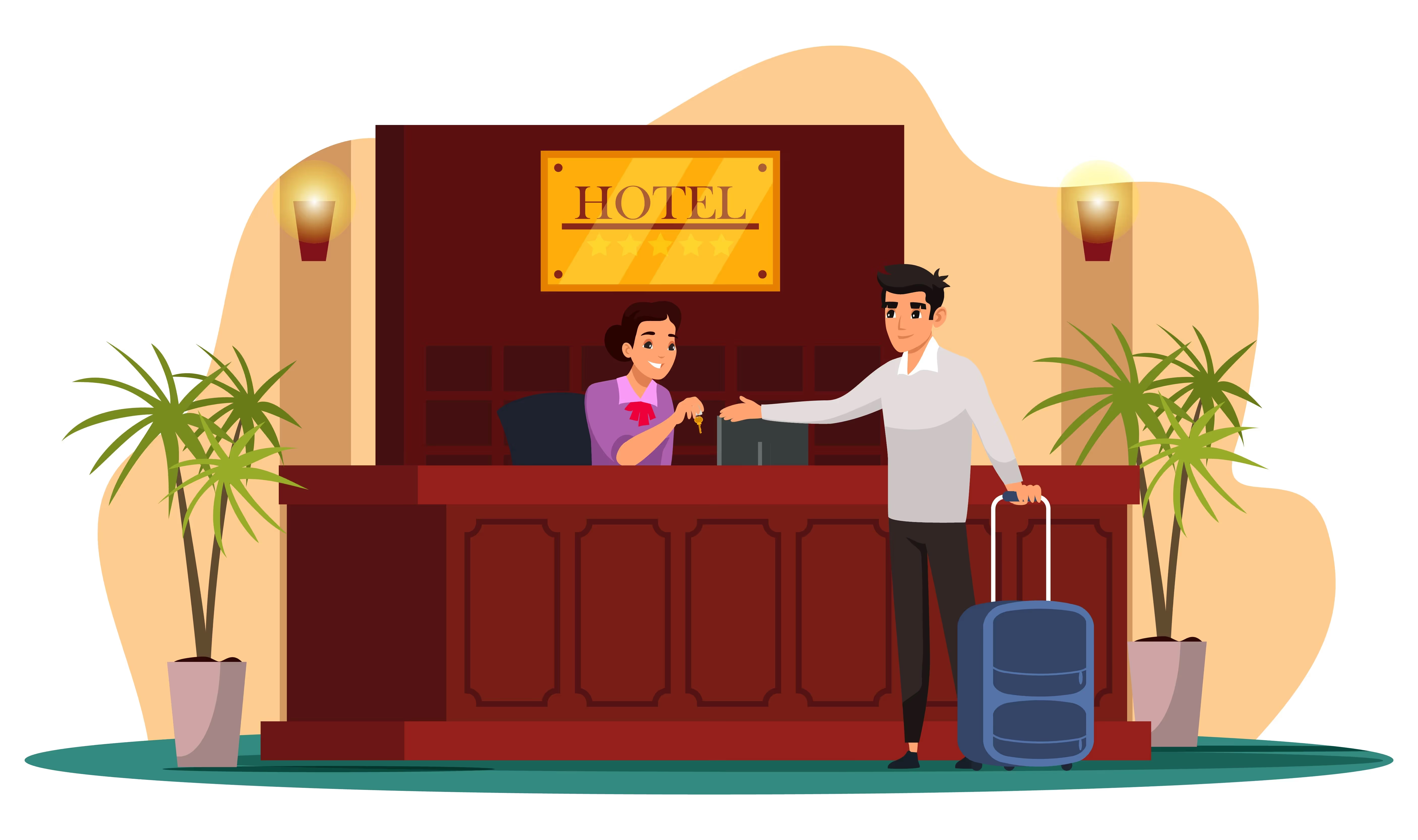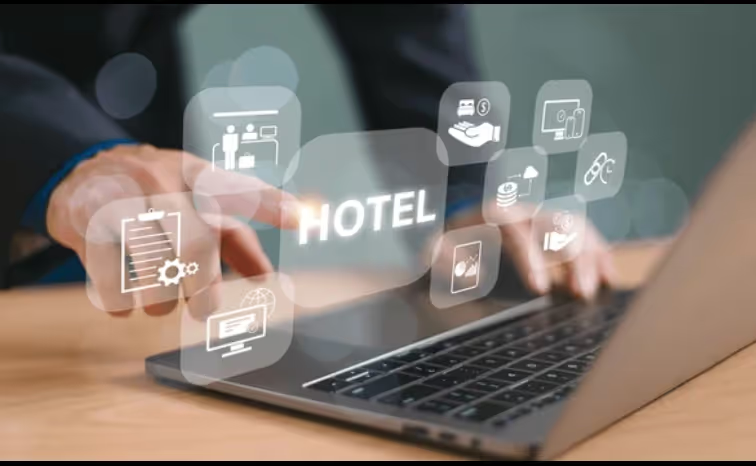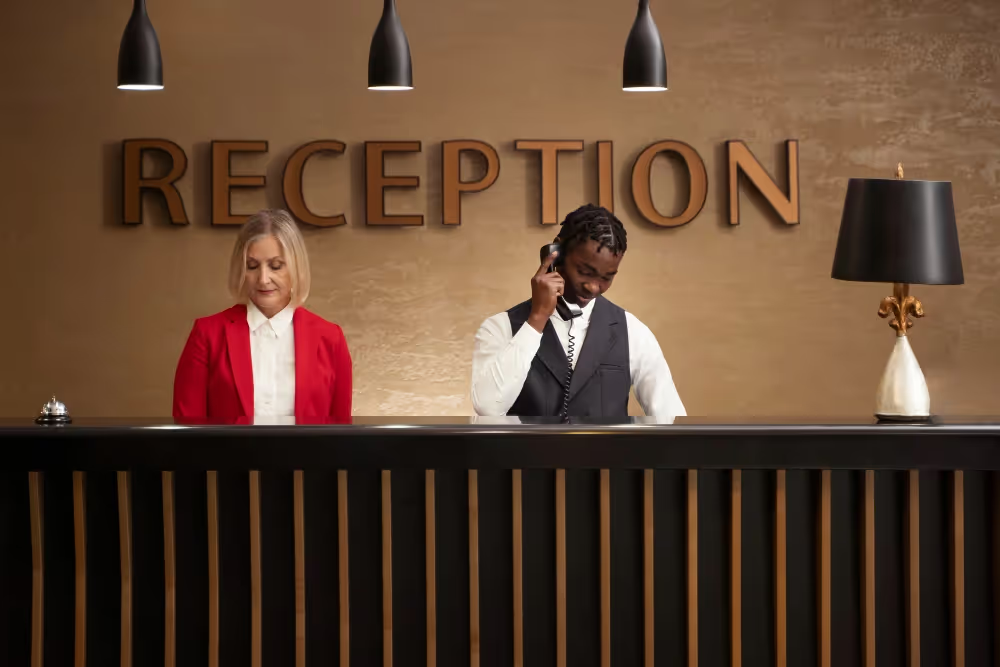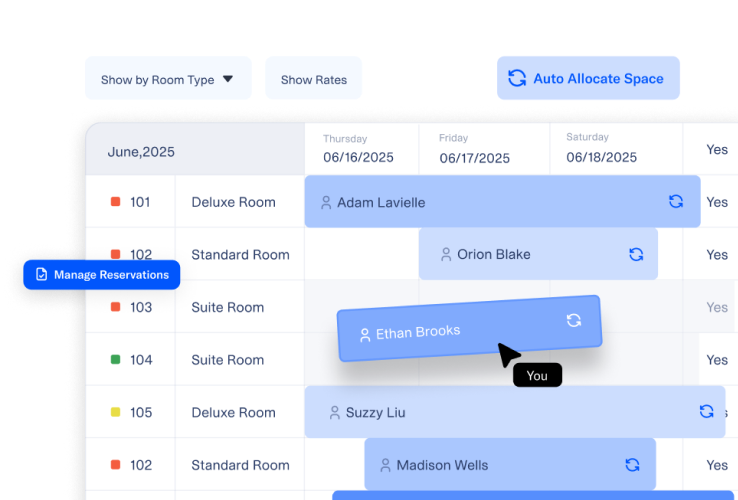Table of Contents
Join Thousands of Hotels Thriving with roommaster
The transition to roommaster is straightforward and efficient. Our implementation team handles data migration including reservations, guest profiles, and historical information.
Hotels run on tight schedules, and staff handle constant guest activity from early morning until late at night. Each area, from front desk to housekeeping, depends on quick decisions, fast communication, and smooth coordination. Managing these moving parts manually creates room for delays, mistakes, and frustration on both sides.
Property management software (PMS) systems help hotels handle tasks like reservations, guest check-ins and check-outs, billing, and daily operations from a central dashboard. As of 2024, the global hotel property management system market reached $3.6 billion, and is projected to grow from $3.8 billion in 2025 to $8.5 billion by 2034, showing a CAGR of 9.2%.
A PMS helps hotels streamline routine tasks and keep services organized across teams. From the time a guest books a room to the moment they leave, each step becomes more accurate and timely. For example, the cloud-based roommaster property management system helps hotels simplify daily tasks such as setting room rates, viewing occupancy in real time, managing billing, and handling guest communication. Hotels can access roommaster from anywhere, making it useful for resorts, vacation rentals, boutique hotels, multi-property setups or parks.
This guide will explain how hotel PMS software transforms hospitality management, what features to look for, and how to choose the right system.

A hotel PMS system is software that helps hotels manage daily tasks like reservations, guest check-ins, payments, and room status from one central location. Front office staff can use the system to view and complete their work faster, with less switching between tools or physical paperwork. Hotels use it to keep bookings organized, track room availability in real time, and manage guest accounts without delays.
The main purpose of a PMS is to run day-to-day hotel operations with fewer errors and more control. Staff can assign rooms, record guest details, process payments, and respond to requests from a single dashboard. This setup reduces confusion, avoids double bookings, and helps staff give quicker responses to guests.
Here are the core components you’ll find in most hotel PMS systems:
Some PMS tools also connect with other hotel functions like guest messaging, marketing, and rate management to give staff better control across the entire property. Hotel PMS systems like roommaster offers a full set of these features in a single platform. Since it is cloud-based, hotel staff can access it from laptops, tablets, or mobile devices without being tied to the front desk.
{{pms-one}}
By using roommaster, hotels can track key business metrics such as occupancy, average daily rate (ADR), and revenue per available room (RevPAR) without doing the math manually.

As part of roommaster’s cloud-based Hospitality Management Software, the PMS connects reservations, payments, housekeeping, and guest engagement into one unified system that keeps daily operations running smoothly. Hotel PMS systems play a vital role for both independent hotels and large property chains by helping teams manage all key operations from one place. These systems reduce manual tasks, speed up guest handling, and help staff stay focused on service.
A PMS should manage reservations across all booking sources without confusion, accepting both direct and third-party online bookings while keeping data accurate. It should track every detail from booking confirmation to room assignment without relying on paper records or manual spreadsheets. With more travelers booking online, hotels need a system that accepts both direct and third-party bookings while keeping data accurate.
With roommaster, managing all of this feels simple and quick. It includes:
Guests don’t want to wait at the front desk, and staff can’t afford delays during peak check-in hours. A PMS should allow front desk teams to process arrivals, departures, payments, and changes quickly, even for large hotel groups.
roommaster handles group and individual check-ins with tools designed for real-world hotel needs, supporting:

Hotels need a payment system that works with their PMS to handle card payments, generate invoices, and apply charges to the right guest accounts. A connected system reduces errors and helps guests receive final bills without delays.
When you use roommaster, billing becomes easier for staff and more transparent for guests with these features:
Front desk staff must always know which rooms are clean, which are occupied, and which need work. A PMS must allow both teams to share updates in real time, so no room is assigned without proper status checks.
In this area, roommaster connects both teams with real-time visibility:
Data helps hotel managers understand what’s working and what needs fixing. Reports from the PMS help them track revenue, room usage, and staff performance without needing a separate tool.
roommaster gives teams access to the reports they need, such as:
When all these functions work together in a system like roommaster, hotels run more smoothly, staff save time, and guests get a better experience from check-in to check-out.
Choosing the right Hotel PMS systems directly improves daily operations and reduces booking mistakes. Small hotels often use an all-in-one setup where the PMS includes a booking engine and channel manager. This setup lets staff view live rates and room availability in one place, which speeds up service and avoids errors.
Buying from one provider usually costs less and reduces support issues. When tools come from the same system, staff spend less time fixing problems and more time serving guests. If you already use a booking engine or hotel channel manager that works, most PMS tools, including roommaster, let you keep those tools through integrations.
Here’s what a good PMS adds to your hotel:

{{pms-five}}
Hotels mainly choose between two types of property management systems, including cloud-based PMS and on-premise PMS, each with its own setup and technical needs.
A cloud hotel PMS runs on internet-connected servers, which means hotel staff can access it from any browser or device without needing special hardware. Vendors handle system maintenance, so the hotel avoids direct responsibility for updates, patches, and security fixes. This setup removes the need for in-house IT teams to manage installations, troubleshoot software issues, or oversee backups.
Cloud-based systems also support mobile access, giving staff more flexibility during daily operations and remote tasks. Most solutions come with modular interfaces that hotels can scale based on their size and operational needs, all accessible under one login. Because the PMS provider manages security and uptime, hoteliers spend less time on technical issues and more time focusing on improving guest service.
An on-premise PMS installs directly on hardware located inside the hotel. All data, system files, and backups remain within the property’s own servers or workstations. This setup requires a one-time installation, but from that point onward, the hotel takes on full responsibility for system maintenance. That includes handling data security, patching software, managing updates, and ensuring system uptime without vendor help.
On-premise setups typically require additional hardware and networking to connect the PMS with systems like point-of-sale (POS) or accounting. As a result, they tend to be more complex and costly to install than cloud PMS solutions. Over time, hotels also face higher operational costs, including license renewals, IT support, and hardware upgrades.
For this reason, large hotel chains and enterprise-level properties often prefer on-premise solutions, while smaller hotels lean toward cloud options due to the simpler support model and lower initial investment.
Picking the right Hotel PMS systems depends on your hotel’s size and needs, since different systems offer core and other new features and add-on modules that suit diverse property types. If you already use a reservation system or business software, choose a PMS that integrates smoothly with those tools. That way, you don’t lose functionality you’ve already built.
To guide your decision, you can review hotel PMS systems examples like roommaster, which supports reservations, channel management, and guest profiles in one cloud platform.
Here’s how to evaluate a PMS effectively:
Technology and systems like hotel PMS systems help hotels run operations smoothly and improve guest service quality. However, these tools deliver results only when skilled staff use them effectively and consistently. Without knowledgeable employees, even the best systems fail to reach their full potential.
roommaster PMS offers a comprehensive, cloud-based solution designed to support hotel teams with easy training, real-time channel management, and powerful reporting. It helps staff work faster and smarter while keeping guests happy.
The Harrison Group’s flagship, Harrison Hall Hotel, proves this in action. General Manager Stacy Dadson says, “roommaster is very easy to train our employees. It’s very self-explanatory.” Their 25-year partnership with roommaster has boosted operational efficiency, prevented overbookings, and transformed guest check-ins into quick experiences.
If you want results and commitment similar to Harrison Hall Hotel’s success, roommaster can deliver the tools and support your team needs. Request a free demo and see how roommaster can improve the hospitality industry operations and enhance guest experiences.
A hotel property management system (PMS) is software that manages daily hotel operations. It handles reservations, guest check-ins and check-outs, billing, and room status. This system centralizes tasks so staff can work faster and reduce errors, keeping operations organized and improving guest service overall.
Hotel PMS systems like the roommaster PMS include reservation management, guest check-in and check-out, billing, and housekeeping coordination. They track room availability, handle payments, assign rooms, and update room status. Many PMS platforms also offer reporting tools and integrations with other hotel services for better control across departments.
A PMS helps hotels reduce mistakes and speed up daily tasks. It lets staff access accurate information quickly, which improves operational flow. By automating manual work, hotels save time and money, while guests receive faster, more reliable service throughout their stay.
A PMS such as roommaster delivers real-time data that lets staff personalize guest interactions and respond faster to requests. Automated check-ins and updated room statuses reduce wait times. This quick, accurate service creates a smoother experience that keeps guests satisfied and encourages return visits.
A PMS manages hotel operations like bookings, check-ins, and billing within the property. A Channel Manager controls how room availability and rates appear on external booking sites. While PMS handles internal tasks, a Channel Manager keeps online listings updated and avoids overbookings across multiple sales channels.
{{cta-strip}}


The transition to roommaster is straightforward and efficient. Our implementation team handles data migration including reservations, guest profiles, and historical information.
See how roommaster's unified platform can work for your property. Our team will walk you through features tailored to your specific needs and operations.